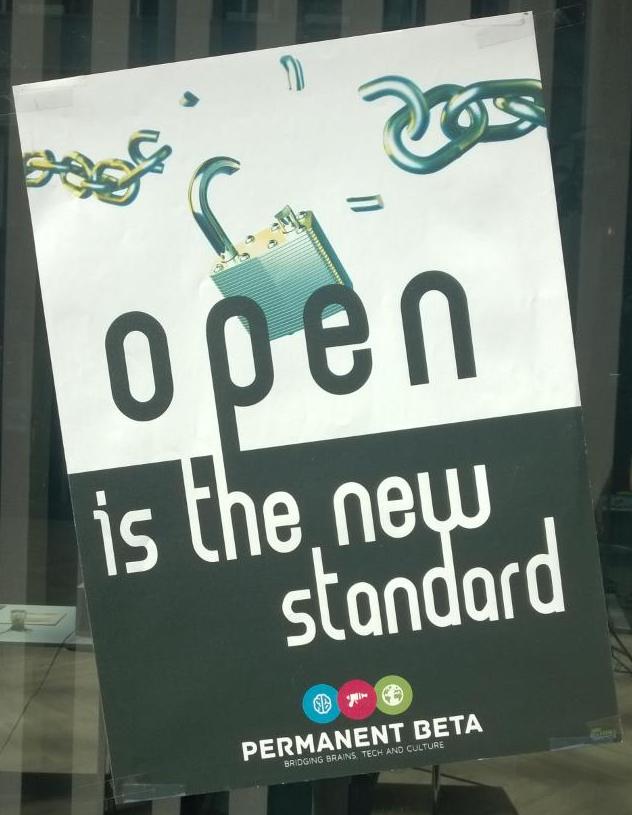AmsterdamConnected. 10:15 AM. Rather quiet, by the looks of it. But nothing could be farther from the truth. The first sharing sessions of this anniversary edition of our Permanent Bèta day have just begun. Today, the app says the program is stuffed with all kinds of readings, workshops, stands, try-outs, innovation or (social) entrepreneurship...
And since the program is in a ‘Permanent Bèta’-state itself, the borders are shifting continuously. There is still room for 1 or 2 keynote speakers. And they are still joining the program, or cancelling their readings due to circumstances as we stand here talking. And that’s all right. That is all part of the plan.
I understand there are ‘garden sessions’ as well today. Which are new to me. And we are exploring the up to date (for now) program overview that consists of at least 50 keynote speakers. We are looking at:
The impact and future of platform organizations like Airbnb and Uber, facilitated by: Martijn Arets;
VR Learning, keynote speaker: Detlef La Grand;
Follow The Money, a young and unrivalled platform in journlism, facilitated by: Eric Smit;
Semco Style, only this time our guest is not Arko van Brakel but Luuk Willems from the: Semco Style Institute;
Saving lives with anti-malaria drones, facilitated by: Guido Welter;
‘Making mistakes is allowed’ is nonsense, keynote speaker: Marjon Bohré;
Gaming: about the powerful combination of games, history and storytelling, facilitated by: Nils Roemen.
And… some sort of magical surprise! Plenary. After dinner, 7:00 o’clock.
Welcome
At the main entrance we are friendly welcomed by Dave and Cat. It’s like ages have past since we were all here at Permanent Bèta Day #8 and Permanent Bèta Day #9 while the last one was only 7 months ago…
For today, they applied for the vacancy of host/hostess of the welcome team and welcome committee. We did a call in our group to make sure novices are feeling comfortable when they enter the building. Until last time, we did not do that. But we came to understand it is nice to welcome people, to provide them some tips and to tell them wat the Permanent Bèta Group is. And what do we do on a day like this.
In our experience, people do not always know what to expect when they are with us for the first time. They visit our sharing sessions, walk around in search of what the purpose is and in the afternoon they roughly understand what Permanent Bèta is.
So we thought: we can do better than that!
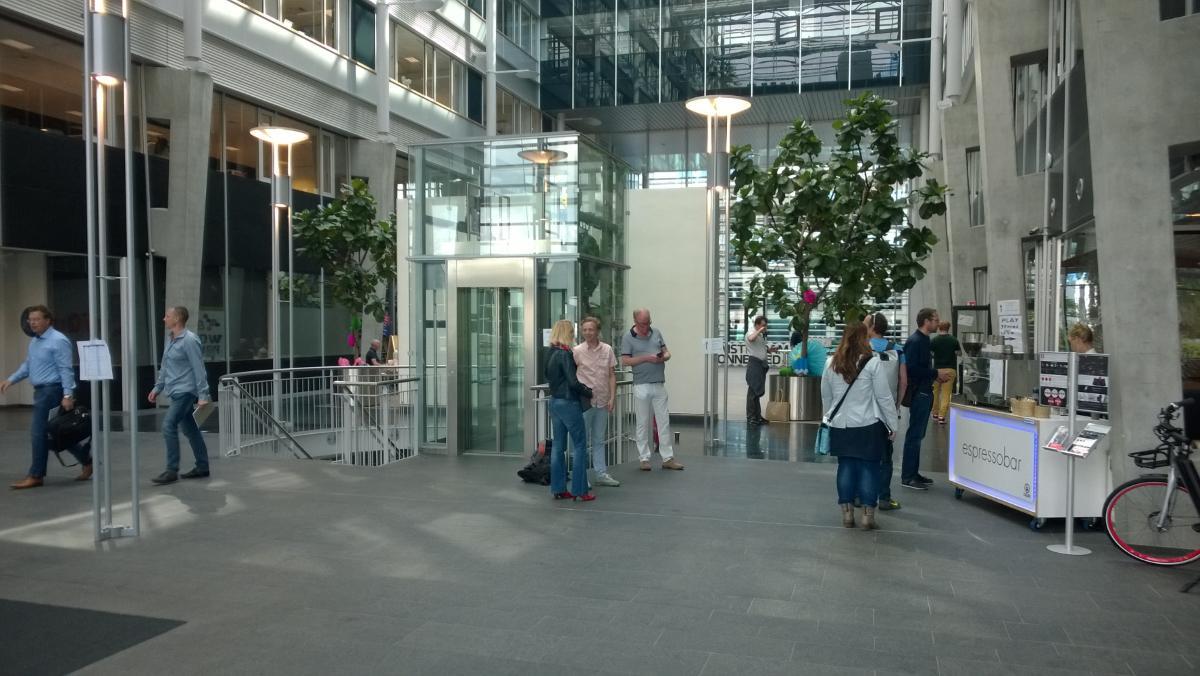
Plenary Playground
The Playground is clearly not visible in our program overview. Despite that, we are building up our menu of ‘inspiration: more than you can handle’ in a relaxed way. We start by just saying hello to the workshop supervisors around here. Therefore, serenity is a good thing right now. It allows me to have a little more, let’s say.. in-depth talks around here.
René is showing me 3 bicycles, of which the third one looks a lot like the Max Skate Bike. I remember going to primary school and me and my class mates were all very excited about it. That was back in the nineties. Indeed, this version is somewhat different. And René wouldn’t run a complete Permanent Future Lab in Apeldoorn (the Netherlands), if he wouldn’t build it into something more sophisticated. There’s an electric plug attached to the bike. By cycling there are no flashing light bulbs for a change (also very useful), but you can recharge the battery of your smartphone. Can come quite in handy during your day!
Books for you: not for free, but without money, paper work and so on
At our regular book spot I walk upon a very interesting action of our authors Erwin Witteveen en Martijn Aslander. They recently wrote a different version of their book ‘Permanent Bèta’. They are promoting this book by inviting all people that pass by to fill in a picture postcard and put it down in the mailbag. On the postcard there’s an image of a mailman delivering letters decades ago. Past times. And as we all know: The Times They Are A-Changin’.
The purpose of this is that, if you know a family member, friend or aquaintance who would profit from reading this book you can fill in his/her name and address. The publisher will deliver this hardcopy postcard to the necesarry address of this person of your choice.
In for storytelling? There is a story behind this idea. This version of the Permanent Bèta book is a little more user-friendly to a large group of people. Nowadays, it could be this group of people that is demographically outnumbering the middle class in the Dutch society.
And without passing judgment on these people, this group is, according to the authors “roughly outlined as: ‘the more mature adult that has reached at least the age of 50. He or she watches the daily news and wonders what on earth is happening in the world. And where the world is going to.”
In my neighborhood I know someone fitting the description. And within only one minute my picture postcard is put down the mailbag.
Also, there are quite a few interesting books of which every copy will be given away! Including Upgrade your life, written by Gina Trapani, Society 3.0 by Ronald van den Hoff, co-owner of the Seats2Meet concept and Flexdenken by Astrid Willems.
Domestic disagreement
We were supposed to be present at the reading of Peter Joosten (Mind is Blown! Edition 2017) at 10 o’clock. But for some reason I always end up in domestic disagreement with sharing sessions that have anything to do with Biohacking. Whether I am late, or there is an unclear room switch, or I do not recognize some sort of ‘deputized’ keynote speaker, or there is some other way we overlook one another…
Can’t do much about it right now. And luckily, we are looking forward to arranging a shared program of Biohacking and our regular Tech Tuesday (similar to Permanent Bèta day) that is always held on the second Tuesday of the month at Seats2Meet Utrecht.
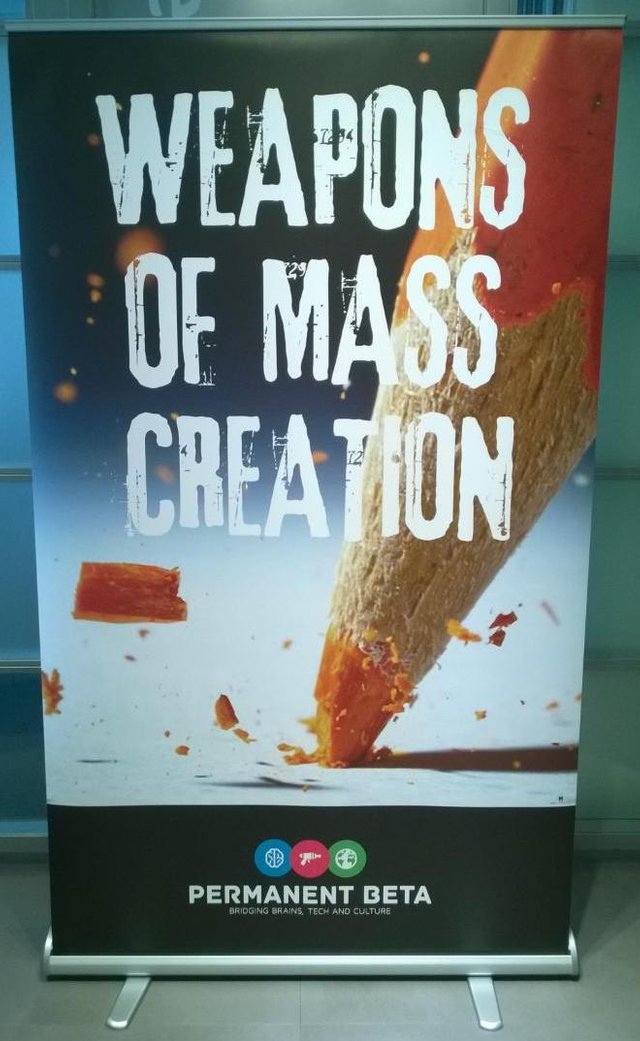
New economy lesson
Long before 11:00 AM we take the elevator up to the first Floor where Jeroen Doensen will be giving his reading: the explanation of the rules of the game in our new economy. It is inevitable that we also mention pretty much everything in the old (current) economy that doesn’t work very well.
Jeroen tells us what should be done in our economy. And what the principles should be.
“In our economy a complete turn over is necessary. On 3 levels. And it will come to us eventually: from distrust to trust, from scarcity to abundance and from fear to love.”
Turn over level 1: from distrust to trust
The audience is pretty much on the same wavelength with Jeroen at this point. Nobody opposes what Jeroen is saying. And it is not exactly a revelation that all systems that we have to deal with as human beings, ‘thrive’ on distrust nowadays. Whether it is the government, the market, or social securities. But the point is very little people become happy to be treated in distrust by our systems. The concept of man is always the same: people are not trustworthy and therefore we regulated this product or that service one way or another. They must be obedient and comply to all our rules, regulations, standards, legislation. That’s because we are in charge.
Turn over level 2: from scarcity to abundance
About this turn over people are a bit more critical. A woman responds with a remarkable example, how and why we are mislead in the concept of abundance:
“You can no longer hand over your abundant possessions at the Second Hand-shop in The Hague. They just have no room for new stuff anymore.”
Jeroen explains with a smile that the concept of abundance is valid and durable. But as a community or society we haven’t organized a lot of things in a very good way. Furthermore, he provides us an remarkable statement:
“With all the technology that is available nowadays, it should be possible to connect your 3D Printer to your garbage can.”
Remarkable, because this statement implicates 3 point of views:
- People shouldn’t be living in scarcity or poverty. If you need anything: there is more than enough for every person on this planet. It is only a matter of division;
- Technology like 3D Printing has been available for years now. If you want to obtain such a printer, it is possible. It is also on its way to the crowd, but it hasn’t reached the mainstream yet;
- Garbage doens’t exist. It shouldn’t be a by-product that is unwanted, but a natural resource that is wanted.
Turn over level 3: from fear to love
“It does exist en it is possible! Until your 18th birthday and after your 67th birthday (retirement). Now , there is only one last part of the population left.”
The Universal Basic Income (UBI) is brought up. And about the things Jeroen is saying: it sounds hopeful to me. Also, we have the actual project of 2.000 unemployed Finns who find themselves in a pilot for 2 years. The receive a UBI from the Finnish government as we speak.
Personally, I am quite a supporter of the concept of an Universal Basic Income. However, there seem to be some intuitive reversal lately. Switserland, for instance. The people and their governemnt put it to a vote. They upholded a referendum. And most of the people of Switserland rejected the idea for an UBI.
Furthermore, we have our own 5 cities and communities in the Netherlands. They would like to start an experiment with our social security rules. But they are opposed by our national government, because they are not allowed to interfere with income politics.
Next to that, I have a feeling the UBI is getting concealed, due to the popular works of fiction about economic growth in the mainstream media and the authorities.
Jeroen is wrapping up the turn over on level 3, by inspiring us with his positive concept of man:
“Basicly, I still believe all people are trustworthy. For example: recently, 2 little girls asked me in public: ‘Can I give you a kiss?’ One after another. In public! This was without any reason or immediate cause. They were complete strangers to me as I was to them. I couldn’t refuse and their mother and I looked at each other.
To me this is the best prove that people are trustworthy. And that they have good intentions.”
The audience responds touched.
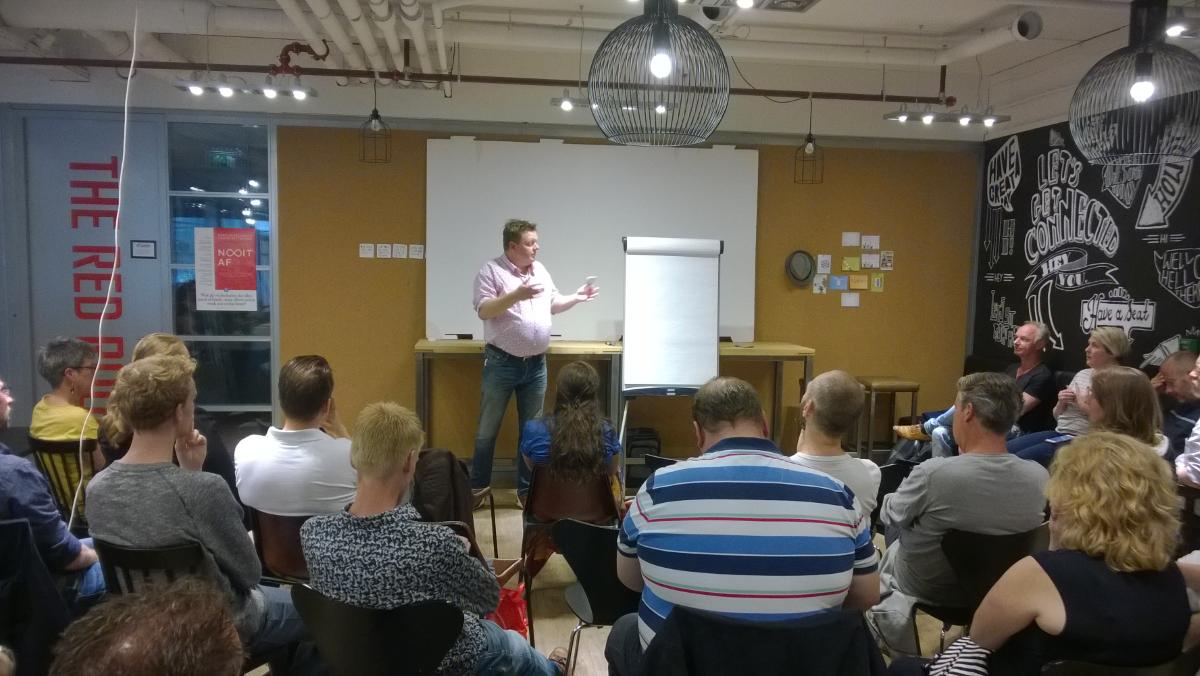
Factfulness: framing, fake news and alternative facts?
We are moving to the second floor. This is where Peter ten Wolde will start his sharing session about Factfulness any minute now. Factfulness means: the stress reducing habit to have an opinion, only about the things of which the facts are grounded.
In order to do so, Peter is working together with the Gapminder Foundation. The Gapminder Foundation investigates all kinds of facts that are stated in the daily news and news distribution.
His sharing session is about navigation: How can you communicate and navigate clearly in these times of framing, fake news and alternative facts?
Interesting. According to reports, only 23% of the American citizens take the mainstream media for granted. Hardly anybody still believes what is stated in the newspapers or on the journal. About the European situation there are no figures available yet. There is nothing conclusively whatsoever. But the basic presumption is that the in Europe we are moving in the same direction.
How to mislead, frame and manipulate
Still, Peter describes point by point how we are systematically mislead and manipulated by the daily news. The mainstream media can use all kinds of tricks to do so. And there can be all kinds of interests at stake. It can be money, or status, or political power. Whoever wants to achieve anything, he or she can find him/herself in choosing all kinds of ‘figure armoury’. From leaving behind the zero’s in a chart, to zooming in or zooming out to make something look more extreme or more marginal presented than it should be. And from measurement selection that is picked less random than it should be, to making use of human number blindness.
Peter shows us a slide about an increase in Facebook likes. And how liking on Facebook can be extremely enlarged, depending on how you look at it. Depending on how one is willing to present such a diagram. Eventually, we see 3 diagrams. The first one ‘proves’ that Facebook likes have shown an explosive development. While in the second diagram the increased number of likes on Facebook is just very, very marginal…
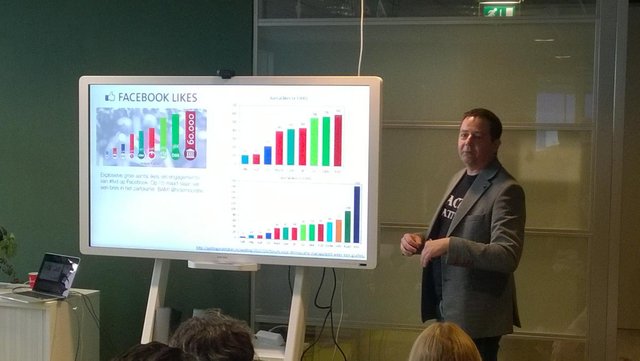
Extreme, global poverty in 1967: larger than 50%
After that, Peter comes up with a diagram about wealth and poverty. Based on income figures of ordinary people world-wide in the year of 1967. The graphics consists mainly of a pair of ‘humps’. Peter coloured the humps in wine red and light blue to make sure the contradistinction stands out. The wine red part can be found on the left side of the diagram. Also, it rises above the other part. These are the people that earn an amount of money that is at least $10. The light blue part on the right is about the people that earn less than $1. Both parts are linked to each other in inequality. And the combined action between the coloured parts look odd. It is almost as if the lower side of the rich part evolves on top of the poor part of the diagram. But whether or not it proves that there is a waver-thin line between wealth and poverty?
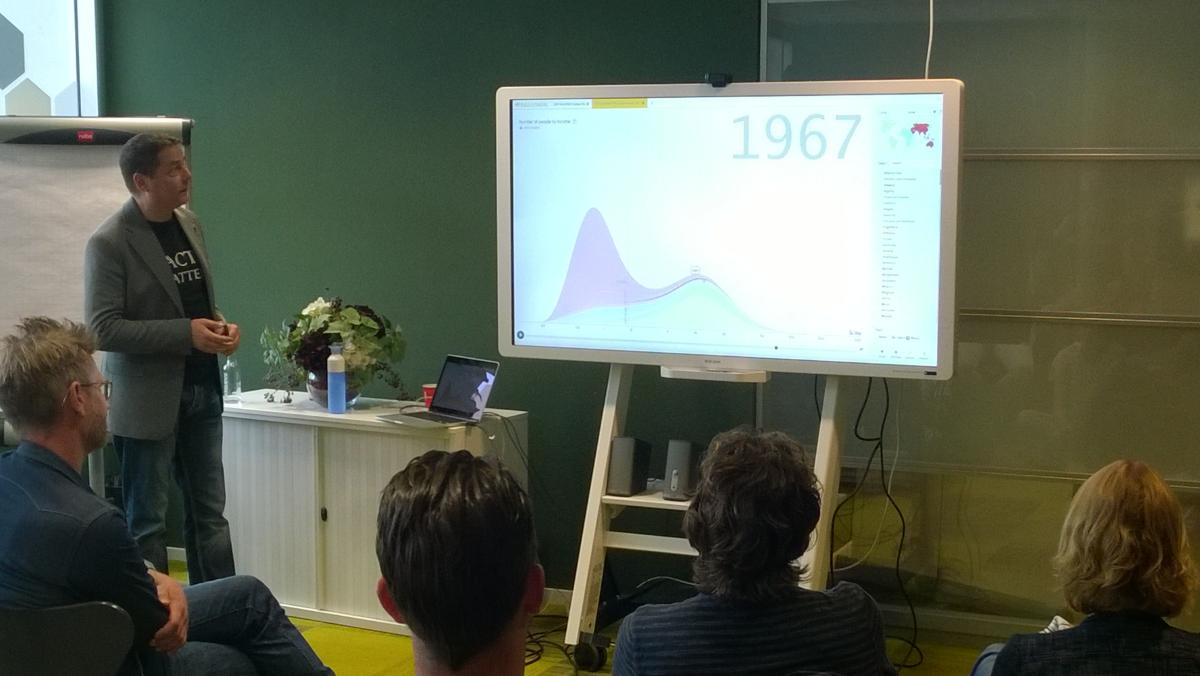
Because of the shape of the graphics Peter is making fun of it by calling it ‘a camel’. Subsequently he jumps from the history to our present time, to the year of 2015. He projects a new diagram on the beamer and both the rich and poor part have gone over in each other. All of a sudden, the graphics now consists of only one ‘hump’. Peter:
“Now, this camel has turned into a ‘dromedary’.”
Extreme, global poverty in 2015: around 11%
Now, we are looking at a modern diagram of the income data of the same ordinary people world-wide. And more differences and deviations in income data have entered the graphics as well. Still, there are lots and lots of cases of extreme, global poverty. This new diagram doesn’t mean we have banished extreme poverty out of the entire world. Jumping to a conclusion like that would be incorrect. But with these figures, Peter proves that the extreme, global poverty has substantial decreased to approximately 11%!
Extreme, global poverty has collapsed with over 40%!
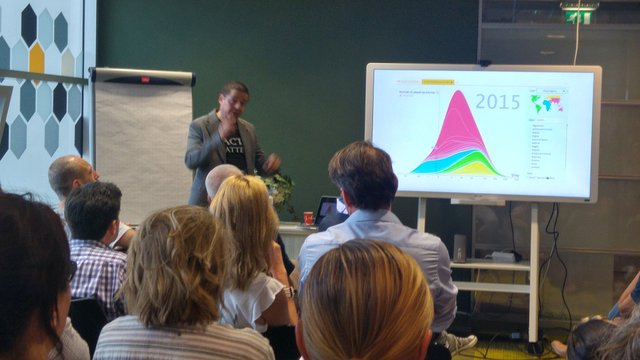
The daily news: fierce, negative and informing about the short term
It is quite obvious that you don’t hear about this kind of positive and long-termed investigations in the newspaper, on television or from the authorities itself. Despite, it is about one of the most persistent problems we still have.
It is because the daily news must be fierce, negative, complaining and aimed at the short term. The general idea is that it must adapt to people’s emotions and the manipulation of these emotions. Also, the mainstream media want to make sure that everyone is able to understand the news they provide. The more people understand, the more news they can spread. And the more money they make. Selling news to the public like this is very saleable and marketable.
Peter goes on by informing the audience that we all have a ‘personal bias’. We are human beings and therefore prejudiced. And the mainstream media, the politicians and officials are taking advantage of that. Peter summarizes his sharing session:
“When you are reading a newspaper or watch the journal: always ask yourself what the author of the facts or figures wants to achieve with informing you about it.”
How do I overcome the mindset the daily news is pouring over me every day?
“1N73LL1G3NC3 15 7H3 4B1L17Y 70 4D4P7 70 CH4NG3. 573PH3N H4WK1NG.”
Before this second sharing session about the daily news we are looking at Sicco Maathuis’ t-shirt. And the encrypted phrase looks promising. It says:
“Intelligence is the ability to adapt to change. Stephen Hawking.”
Sicco is one of the last minute keynote speakers and one of our main co-organizers. He didn’t join the list of keynote speakers since there was a shifting in the program overview this morning. So the contents of his sharing session is still unknown until now.
You’d think his reading would be in the extend of Factfulness. But in Peters reading the bottom line was the news. Whether it does add up or not.
Sicco’d sharing session is about you. How are you affected by being informed about all kinds of violent attacks, disasters, wars and so on? Not to mention all this loud clamor of so-called ‘experts’ who tumble over each other trying to make a point. What does the news do to your attitude to life? And since you are not able to avoid contact with the daily news, how can you deal with it in a more positive way?
Therefore, his sharing session is titled: How do I overcome the mindset the daily news is pouring over me every day?
"Just quit watching the news!"
Sicco explains to the audience that he is not watching the news anymore. Which is great! That means I am not the only one. Although, he hasn’t thrown his television out of the window like I did.
Nevertheless, he is strongly aware of the impact of all this negative and complaining news. He guards his positive attitude to life and makes sure it is not corrupted by all kinds of disasters and incidents. Wherever they might happen on our planet. Recently, he became a father as well and he wants to put down a positive attitude towards his children.
We are looking at different slides in his presentation. The solutions about how you can handle the daily news best is about finding a balance. And this is different for everyone. People have to make their own decision in this case. But the general idea is: “Quit watching the news.” And if necessary: throw your television out of the window.
Martijn Holtes, who happens to be sitting in between the audience, and who is also one of our main co-organizers endorses Sicco on his point of view.
I think to myself that you are also still paying for all these kinds of daily doom messages every month! These days, you should be able to ask your cable provider about an all-in-1 package without television. Still, you cannot get yourself a deal on that. At least not with Ziggo, one of our main cable providers.
Keep looking for other kinds of news
Sicco continues that we should be looking for other kinds of news. You can replace all this negative news by news that is more positive. It is there! And in his PowerPoint slides we see quite a few examples of other kinds of news.
For instance, Sicco shows us a depressive news article in which it is said that we are running out of oil. There is also a picture and description about reopening the coal mines. But only to find out that Sicco’s next slide is about nanotechnology. We can litterally build a windmill with nanotechnology and receive windpower. And this kind of technology is available for everyone.
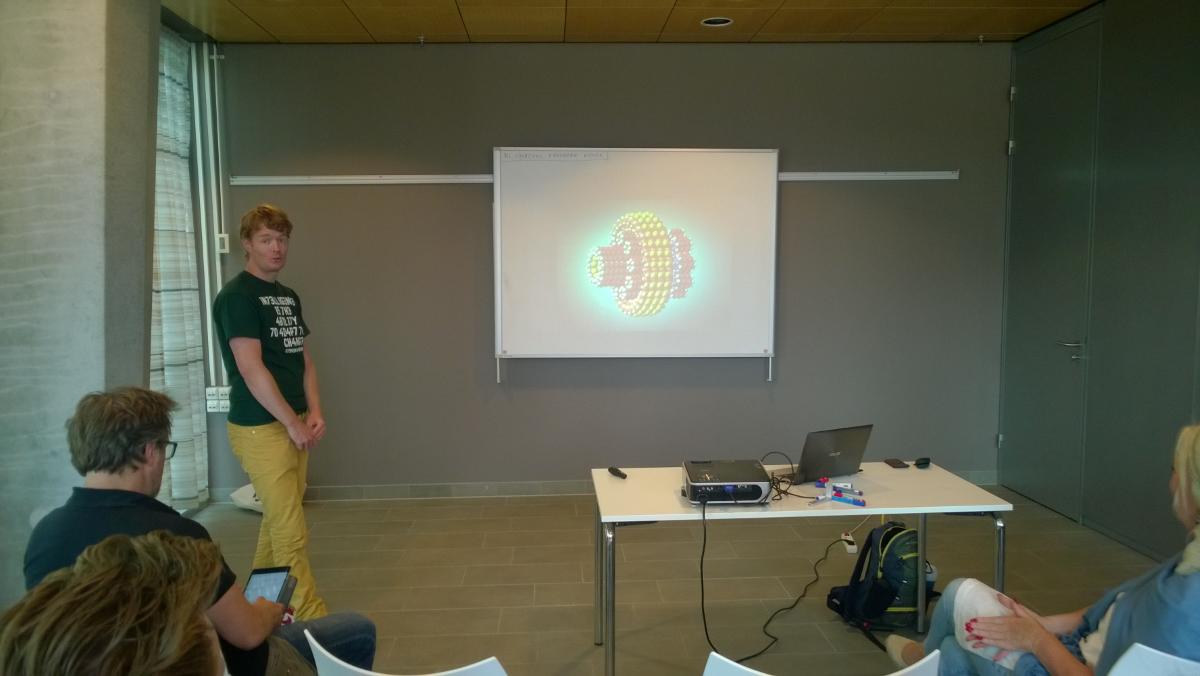
Organizing without money, paper work and so on
From being reactive to the news, we’er making quite a u-turn to proactive to Permanent Bèta backstage. How do we realize a Permanent Bèta day like today? Because pretty much everything that is organized, is taken care of without money, paper work and other strains of bureaucracy. And the co-organizers would like to tell the audience about how they do what they do.
The Dutch word for it is ‘organizonderen’ meaning ‘organizing without’. That is the main theme for the next sharing session.
The co-organizers also let us know that depending on who you ask your questions, you will be getting another answer all the time.
Martijn Aslander is kicking off by telling people how he started to build our network organization: Permanent Bèta. He was with several people at the Chamber of Commerce in Amersfoort when they learned that you can actually get buildings or properties for free, just as lang as you have a good story and a purpose for it.
Meanwhile, they organized about a few hundred Meetups without money, paper work and other strains of bureaucracy. He lets us know that things “have gone a little bit out of proportion.”
At Permanent Bèta there is room for ideas, people, proposals for an experiment or a new project. Anything that you’d like:
“If you can’t have an excited Permanent Bèta day, you obviously chose the wrong program sections time after time.”
The audience understands that this beautiful location, AmsterdamConnected is organized without any money or paper work as well. That includes all keynote speakers, knowledge, inspiring sharing sessions and all shared technology and so on. You can come in, join and learn something new with what you do as you please. No one presents you the bill, no one makes money, no one is compensated in a material way. It is even a fact that no one is handing out business cards.
But there is more to it: the big success of the network organization is mainly drawn to the ‘hugging factor’.
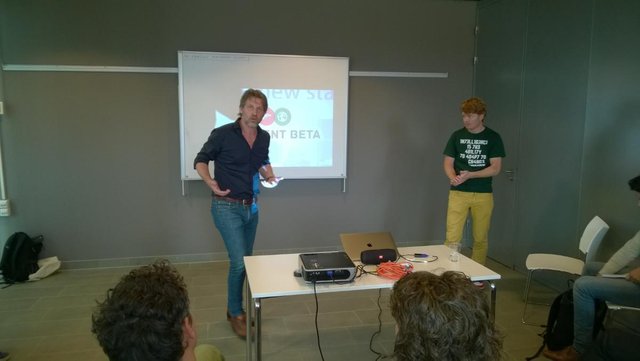
Think tank Permanent Bèta Lab
Than it is Kim van den Berg’s turn to provide the audience with other examples and concepts about what Permanent Bèta is. And what it does. And how they managed to learn what is working and what isn’t over the years.
Sicco completes her story by adding a very good example of how the co-organizers organize without money, paper work and so on:
“Until this morning we were one beamer short. And no matter what we tried we just couldn’t get our hands on one extra beamer, these past few days. Then, we stopped trying to get one and invited all our keynote speakers in de hall. We asked them: “Who can take care of his sharing session and give a reading without a beamer?”
There were a few keynote speakers who didn’t need one. Trouble solved!”
For the time being Kim, Sicco and Martijn would also like us to know that they want to step back in organizing the Permanent Bèta day. They ask the audience if people are interested in taking over the role of co-organizer. And this is where we first hear of our new initiative: the Permanent Bèta (Field) Lab. This entire new think tank helps out the co-organizers with all kinds of problems or challenges.
Although they want to step back, they ensure us that it doesn’t mean they will not be involved in any way anymore. Everone who would like to set up a Meetup for the Permanent Bèta Group can do so without asking for permission. And they can always ask for advice, or get help to make sure the Meetup will be a success. No matter what.
What will we do now?
Rumor in the room. Erik, who has a front row-seat, is willing to take over the role of co-organizer for the Permanent Bèta day. The rest of the audience is quite enthusiastic. They discuss the possibilities with each other. But bottom line, no one else is raising their hand.
Martijn Holtes says you are completely free to organize a day like this as you see fit. There is no blueprint, scenario, screenplay whatsoever. Everone is allowed to set up a Meetup, to schedule keynote speakers. Just as long as it is in our triangle: “Bridging brains, tech & culture.”
To me that is no surprise. As the Permanent Bèta Group we do believe in sharing for sharing. Not in sharing for receiving. Furthermore, we believe dat every imaginable individual problem or societal challenge can be solved in this triangle. And in the intersection of science, technology and art and/or culture. All kinds of new knowledge and natural connections evolve and arise by human beings working together on different projects. We know that every problem can be solved with an option that comes from another specialism or working area. Therefore, these connections between people and all kinds of human interaction are very, very important.
This concept may sound familiair to you. Only you might have heard it being described as: serendipity.
Permanent Future Lab
16:00 PM: inspiration overload! We are avoiding the program a little longer than we originally planned out. We go back to say hello to Jurjen and Ramon, who also represent the Permanent Future Lab.
Permanent Future Lab is a similar movement to Permanent Bèta. The difference is that Permanent Future Lab is not about science or art and culture. It is there for one purpose and one purpose only: technology. Today, the Lab is represented for our current locations Apeldoorn, Utrecht and Amsterdam. By René, Jurjen and Ramon. It is situated in the big entrance-hall. And I seem to remember how I and Michel took every last table from the Permanent Bèta office itself yesterday. Just to make sure there was enough room for all cutting edge-technology.
As usual, the Lab has the most advanced and progressive technology under its supervision. There is something that attracts my attention: it is some sort of red speaking pole that is programmed and based on a Raspberry (OS Linux and Python). And this pole also has a large pressing button and speakers that are built-in to playback MP3-soundclips. And all kinds of sensors can be attached: IR-movement sensors, sound sensors, temperature sensors, moisture sensors, x-y-z speeding sensors…
On top of that one can also add bluetooth, NFC and a regular camera for example. All kinds of functionality are determined by the programmer. Therefore, the speaking pole can be deployed in various situations in a very smart and a very multifunctional way. Like an extension piece of a reception or a counter outside. Or next to a coffee machine in some kind of boring office and just talk about any curiosities that people may be interested in. Or to accomplish (game)assignments.

Fun fair complex
Due to the location of the speakers, every comment is coming out of some sort of cylinder-like bowl which contains a water sprinkler inside. The bowl is standing on the table just a few feet away from the pole. Every time you press the button you can hear some kind of comment and water is sprayed up in the bowl.
Usually, the speakers are assembled and connected inside the pole. But now you have the possibility to present this kind of technology a little more original and let’s say notable.
This red, speaking pole is used quite a lot at the Permanent Bèta festival in the woods in Drenthe as well. Including this year at the beginning of september 2017. But right now, it makes me crazy already. Because we are at least half an hour listening to the exact same sentence on about a fun fair attraction. Over and over again.
Virtual Reality
Next to the Permanent Future Lab and all kinds of supporting attributes, we hear all kinds of astonished shouting and yelling. Interested minds put on VR glasses of a company called Drone Addicts. On the screen we can see a sky-high part of the big city. And some people are accompanied by their children when they go for a stroll (or jump) from skyscraper to skyscraper.
To make it even more real, the stand holder has put down a shelf on the ground.
When you walk over that shelf while you are wearing this big VR-glasses it appears to be quite scary.
Shortly before I also saw Detlef, one of our keynote speakers making all kinds of footage here. Unfortunately I couldn’t be at the sharing session he gave this morning: VR Learning.
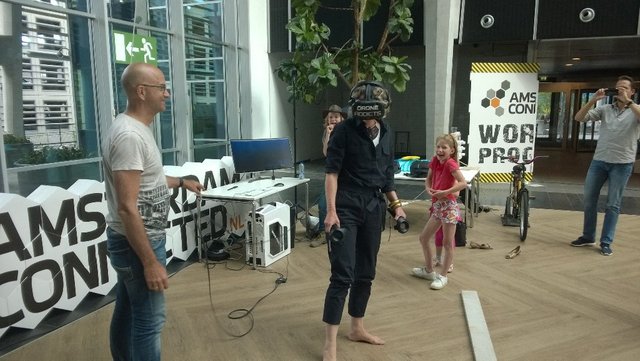
George Parker, professional illusionist
“It is my job to use a lie to show you something of the truth. An image tells you more than a 1000 words and an experience tells you more than a 1000 images.”
After the announcement by Martijn George has mounted to get on stage. Evening falls when we arrive again at the Plenary Playground and find out the magic surprise is a professional illusionist! Now I understand why the co-organizers were fussy about the word ‘magic’ all the time.
After using a short prologue and the well-known illusions with the rope that is one moment cutted through and the other moment all back in one piece, George starts with his actual message to the audience. He tells us about his own war story of losing. About his participation at a game best known as Cup Confusion. The game supervisor lied a devious trap for him when George saw another man winning money at the game. He decided to roll the dice as well:
“Men tend to credit themselves and find themselves perfect if they succeed. If they fail, it is always someone elses fault or it is about external factors.”
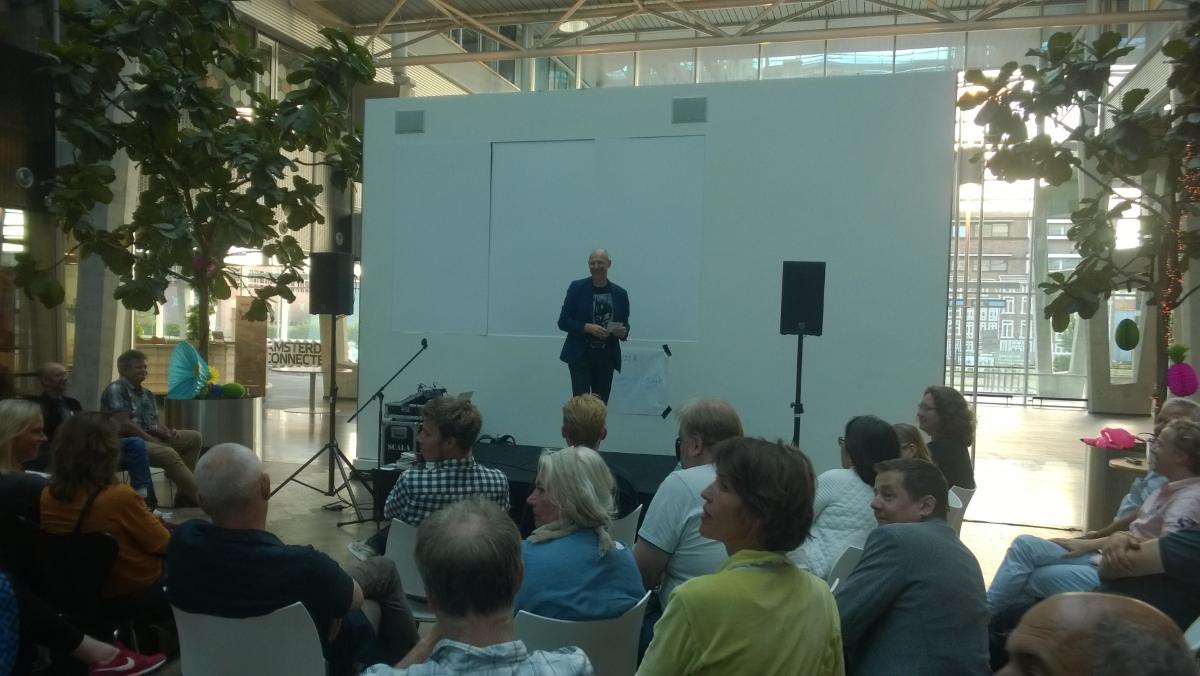
The winning card
To prove his point about the traps that are lied down in the game of Cup Confusion, he is showing us two decks of cards. One deck of cards is a normal deck. The other one is a deck of cards sized XXL.
He is playing the game of The Winning Card with several volunteers with both decks of cards. To us it is obvious that the principle of the game of The Winning Card is very similar to the principle of Cup Confusion. He is playing the game with the volunteers over and over and over again. All contestants lose. He keeps outsmarting them. After one of the manly volunteers has lost the game again, he asks him:
“How do you feel about this?”
After that, he goes into the game a little deeper with the audience. And George clearly explains what keeps going wrong when you participate. First of all, he shows us 3 open cards, after which he trades their places. We can still see what is going on. Next, he flips the cards into his direction in order to make sure we cannot see what will happen:
“What will you do when you can’t see the cards anymore. When you can’t check the cards anymore your next step is to make an assumption! And your assumption turns into a persuation. And eventually, your persuation turns into a belief.”
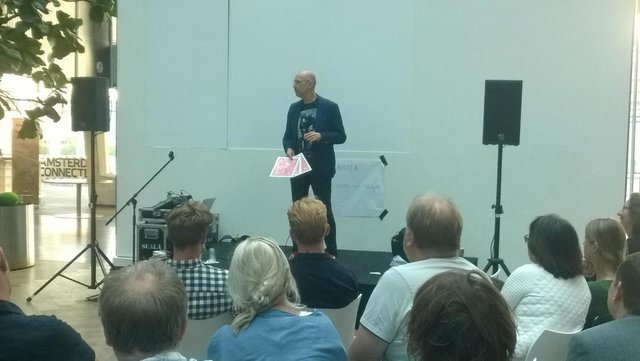
The Social Impact Factory
After the magic show, the Permanent Bèta day comes to an end. We are asked to put back all the seats that we are still sitting on and to help out with finishing and cleaning up.
Including this time, we managed to have an over-exclusive program. And we may look back at a very succesful 10th anniversary edition. And to a good excuse for submitting a story of 10 pages here on Steemit ;-)
A singular detail about Permanent Bèta day 11 (#PBdag11) has been released: it will be held on the 27th november at The Social Impact Factory in Utrecht. The Social Impact Factory is also some kind of mini metropole. Just like AmsterdamConnected. A mini metropole where all kinds of Labs, innovation and social entrepreneurship come together and work together on several general interests and projects.
On top of that, we already co-organized Tech Tuesday along with Permanent Future Lab and Seats2Meet Utrecht over there two times. And the social reach, the applications and the diversity in people, sharing sessions and results in creating value only have increased ever since.
